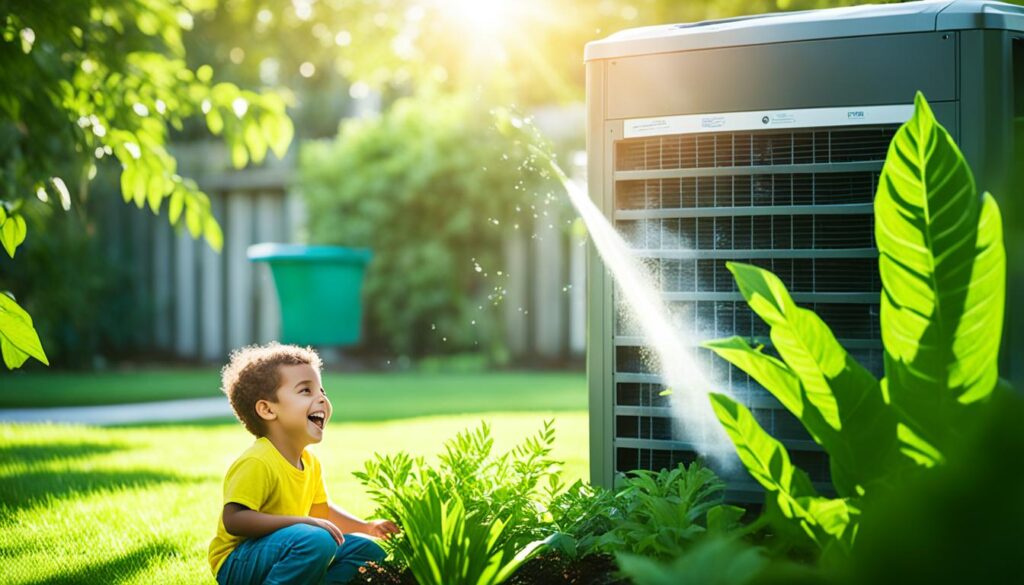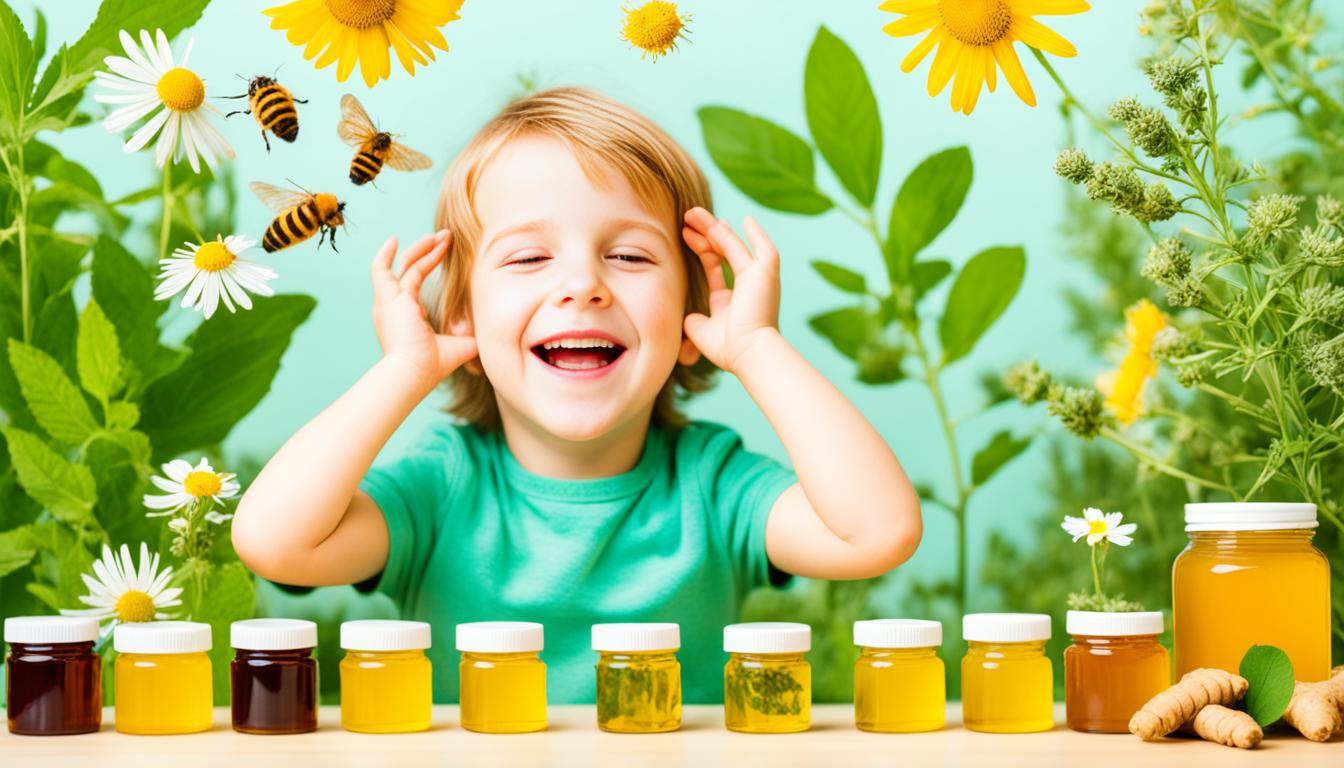Seasonal allergies, also known as hay fever, can be a common problem for kids. When their little noses start to twitch and their eyes become watery, it’s natural for parents to want to provide relief. However, many over-the-counter medications come with unwanted side effects. That’s why it’s important to explore natural remedies that are safe and effective for kids.
In this article, we will discuss 10 natural remedies that can provide relief from allergies in children. These remedies are free from the side effects often associated with medication and can help your child find relief from sneezing and sniffles naturally. Say goodbye to the constant discomfort and help your child enjoy the great outdoors again!
Key Takeaways:
- Seasonal allergies can be a common problem for children, causing sneezing, itching, and runny nose.
- Natural remedies offer safe and effective relief from allergies without the side effects of medication.
- Home remedies such as staying hydrated, consuming quercetin-rich foods, and using onion as a natural antihistamine can provide relief.
- Herbal remedies like stinging nettle and ginger have been found to have anti-inflammatory and immune-boosting properties.
- Dietary changes, such as including antioxidant-rich foods and avoiding dairy during allergy season, can reduce allergy symptoms.
- Lifestyle tips like keeping the indoor environment allergen-free and minimizing outdoor activity on high pollen days can also help manage allergies.
Understanding Allergies in Children: Causes and Symptoms
Allergies in children can be caused by various factors, such as pollen, dust mites, pet dander, and certain foods. These external triggers can lead to an allergic reaction in some children, resulting in a range of symptoms.
Common symptoms of allergies in children include:
- Sneezing – frequent or repetitive sneezing can be a sign of an allergic reaction.
- Itching – children may experience itchiness in their nose, eyes, throat, or skin.
- Runny nose – nasal congestion and a constantly runny nose are common symptoms of allergies.
- Itchy eyes – red, watery, and itchy eyes are often associated with allergic reactions.
- Coughing – persistent coughing, especially when it worsens in certain environments or during specific seasons, may indicate allergies.
By understanding the causes and recognizing these symptoms of allergies in children, parents can take appropriate measures to help manage their child’s allergies effectively.
Home Remedies for Natural Allergy Relief in Kids
If your child is suffering from allergies, you may be looking for natural ways to relieve their symptoms. Fortunately, there are several home remedies that can provide relief without the need for medication.
Stay Hydrated
Drinking plenty of water can help moisturize the nasal passages and reduce congestion. Encourage your child to stay hydrated throughout the day to alleviate allergy symptoms.
Incorporate Quercetin-rich Foods
Foods rich in quercetin, such as green vegetables and citrus fruits, have natural antihistamine properties. Including these foods in your child’s diet can help reduce allergic reactions.
Use Onion as a Natural Antihistamine
Onion contains quercetin and other compounds that act as natural antihistamines. You can incorporate onion into your child’s meals or use it in cooking to help alleviate allergy symptoms.
Try Local Honey
Local honey is believed to contain small amounts of pollen from local plants. Consuming small amounts of local honey can help desensitize your child’s immune system to the pollen, reducing allergy symptoms over time.
Peppermint Tea and Eucalyptus Oil for Congestion
Peppermint tea and eucalyptus oil have menthol, which can help relieve congestion. You can offer your child a warm cup of peppermint tea or try using eucalyptus oil in a diffuser to ease their nasal congestion.
Spicy Foods for Nasal and Throat Passage Clearing
Spicy foods, such as chili peppers and horseradish, can help clear nasal and throat passages. Incorporating these foods into your child’s meals can provide relief from congestion and improve breathing.
| Home Remedies for Natural Allergy Relief in Kids | Benefits |
|---|---|
| Stay Hydrated | Moisturizes nasal passages and reduces congestion |
| Incorporate Quercetin-rich Foods | Natural antihistamine properties to reduce allergic reactions |
| Use Onion as a Natural Antihistamine | Contains quercetin and other compounds that act as antihistamines |
| Try Local Honey | Desensitizes the immune system to pollen, reducing allergy symptoms |
| Peppermint Tea and Eucalyptus Oil for Congestion | Relieves nasal congestion and improves breathing |
| Spicy Foods for Nasal and Throat Passage Clearing | Clears nasal and throat passages, improving congestion |
These home remedies provide natural relief from allergy symptoms in kids. However, it’s essential to consult with a healthcare professional before trying any new remedies, especially if your child has any underlying health conditions or allergies.
Herbal Remedies for Children’s Allergies
When it comes to alleviating allergy symptoms in children, herbal remedies can provide effective relief. Certain herbs have been found to possess anti-inflammatory, antihistamine, or immune-boosting properties, making them suitable natural alternatives. Here are some herbal remedies that can help manage children’s allergies:
- Stinging Nettle: Stinging nettle is known for its anti-inflammatory properties and can help reduce nasal congestion and itching.
- Perilla: Perilla leaves contain compounds that have been found to inhibit allergic responses and provide relief from symptoms such as sneezing and runny nose.
- Sea Buckthorn: Sea buckthorn is a potent antioxidant that helps boost the immune system, potentially reducing allergic reactions in children.
- Butterbur: Butterbur has been shown to have antihistamine effects, making it useful for relieving allergy symptoms such as nasal congestion and watery eyes.
- Ginger: Ginger has natural anti-inflammatory properties and can help soothe allergic reactions, particularly those related to respiratory issues.
- Yarrow: Yarrow is a herbal remedy that possesses anti-inflammatory and antihistamine properties. It can help reduce allergic symptoms such as sneezing and itching.
These herbs can be consumed in various ways, including as teas, added to foods, or taken in supplement form. However, it is essential to consult with a healthcare professional before introducing herbal remedies to children. They can provide guidance on appropriate dosages and potential interactions with any existing medications.
By incorporating these herbal remedies into your child’s allergy management routine, you can provide them with natural relief from allergy symptoms, allowing them to enjoy their day-to-day activities without discomfort.
Dietary Changes to Alleviate Children’s Allergies
Making dietary changes can play a significant role in alleviating allergies in children. By incorporating specific foods into their diet, parents can support their immune system, reduce allergy symptoms, and promote overall well-being. Consulting with a healthcare professional or allergist is crucial before implementing any significant dietary changes for a child with allergies.
One effective approach is to include antioxidant-rich and anti-inflammatory foods that can support the immune system and help reduce allergy symptoms. Fruits such as berries, grapes, and citrus fruits, along with vegetables like spinach, kale, and broccoli, are excellent choices due to their high antioxidant content.
Avoiding certain foods during allergy season can also be beneficial in reducing congestion and histamine release. Dairy products, for example, can contribute to increased mucus production and worsen allergy symptoms. Temporarily avoiding dairy or opting for alternative milk options like almond or oat milk can help alleviate these issues.
It’s important to note that each child’s allergies may differ, and it is essential to consult with a healthcare professional or allergist to determine the most suitable dietary changes for your child. They can provide personalized recommendations based on your child’s specific allergies and medical history.

Benefits of Antioxidant-Rich and Anti-Inflammatory Foods:
- Fruits and vegetables high in antioxidants can support the immune system and reduce inflammation in the body.
- These foods provide essential vitamins and minerals that contribute to overall health and well-being.
- By consuming a variety of colorful fruits and vegetables, children can benefit from a range of antioxidants.
“A well-rounded, nutritious diet that includes antioxidant-rich foods can provide significant relief for children suffering from allergies.” – Dr. Sarah Adams, Pediatric Allergist
Tips for Implementing Dietary Changes:
- Gradually introduce new foods to your child’s diet to allow their taste buds and digestive system to adjust.
- Encourage your child to be involved in meal planning and preparation to increase their engagement and willingness to try new foods.
- Explore alternative dairy-free options, such as nut milks, for children with dairy allergies or sensitivities.
Lifestyle Tips for Managing Children’s Allergies
In addition to natural remedies and dietary changes, there are several lifestyle tips that can help manage kids’ allergies. These holistic approaches can provide relief and reduce the impact of allergy symptoms on your child’s daily life.
Keep the Indoor Environment Clean
Regular cleaning and dusting can help minimize allergens in your home. Vacuum carpets and upholstery frequently, paying special attention to areas where allergens tend to accumulate. Use a damp cloth while dusting to prevent allergens from becoming airborne. Washing bedding regularly in hot water can also help remove allergens.
Use Air Purifiers
Air purifiers are effective in capturing and filtering out allergens like pollen, dust mites, and pet dander. Place air purifiers in your child’s bedroom and other frequently used areas to create a cleaner and healthier indoor environment. Remember to clean and replace the filters as recommended by the manufacturer.
Encourage Regular Handwashing
Handwashing is an important practice to minimize exposure to allergens. Encourage your child to wash their hands thoroughly with soap and water, especially after outdoor activities or contact with potential allergens. Good hygiene practices can help reduce the likelihood of allergens entering the body through sensitive areas like the eyes and nose.
Minimize Outdoor Activity on High Pollen Days
Pollen is a common trigger for allergies, especially during spring and summer. Check local pollen forecasts and minimize outdoor activities on days when the pollen count is high. If your child needs to go outside, consider wearing sunglasses to protect their eyes and using a hat or a scarf to cover their nose and mouth.

“Clean and allergen-free indoor environments, regular handwashing, and minimizing outdoor exposure on high pollen days are essential lifestyle measures for managing children’s allergies.”
By incorporating these lifestyle tips into your child’s routine, you can create a healthier and more comfortable environment for them. These holistic approaches, combined with natural remedies and dietary changes, can help provide holistic allergy relief and improve your child’s overall well-being.
Conclusion
Allergies can be a challenging issue for kids, but there are numerous natural remedies and lifestyle changes that can provide relief for natural allergy relief for kids. By incorporating these strategies into your child’s routine, you can help them find relief from sneezing and sniffles without the need for medication. From home remedies like consuming foods rich in quercetin and using onion as a natural antihistamine to incorporating herbal remedies like stinging nettle and ginger, there are plenty of options to explore for kids allergy relief.
It is important to consult with a healthcare professional before starting any new remedies or making significant changes to your child’s diet or lifestyle for natural remedies for children’s allergies. They can provide personalized guidance based on your child’s specific needs and circumstances. Together, you can develop a holistic approach that addresses your child’s allergies and supports their overall well-being.
Say goodbye to allergies and embrace a healthier, happier life for your little ones. With these natural allergy relief remedies, you can help your child enjoy their day-to-day activities without the discomfort of allergy symptoms. Remember, natural remedies for children’s allergies are a safe and effective alternative to traditional medication. Start implementing these strategies today and witness the difference they can make in your child’s life.


